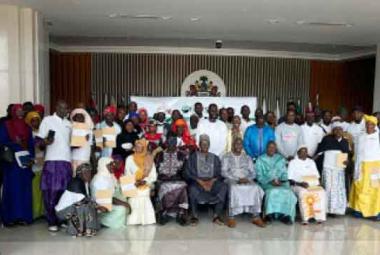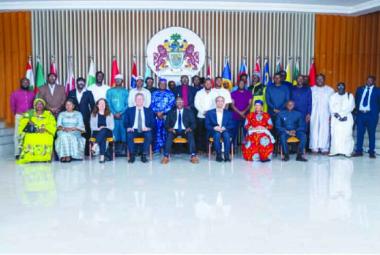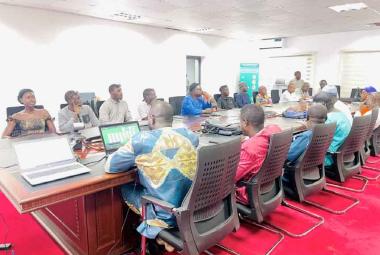By Fatou B. Cham
The Gambia Inclusive and Resilient Agricultural Value Chain Development Project (GIRAV) held a farmer field day on Saturday, 26thNovember 2022, at Bambali, North Bank Region (NBR).
The field day is aimed at facilitating the sharing of experiences and best practices as well as promoting access and the adoption of improved climate-smart technologies: high-yielding early maturing, drought-resistance, and salt-tolerant seeds varieties for farmers.
The event was supported by the Central Projects Coordinating Unit (CPCU) under the Ministry of Agriculture through the World Bank-funded GIRAV project. It was attended by over 100 people mainly farmers from across the NBR.
Speaking at the event, Mr. Lamin Saidykhan, Governor of North Bank Region (NBR) applauded the contribution of GIRAV in increasing access and the adoption of climate-smart technologies and innovations for improved food and security and increased income for smallholder farmers.
Governor Saidykhan reiterated that the Gambian Government is concerned about the increasing level of food insecurity in the country and appealed to farmers not to sell all their produce.
He however stressed that the impacts of the COVID-19 pandemic and the ongoing Russia-Ukraine war amidst rising cost of living across the globe, deepening levels of poverty, food insecurity, and hunger require a change of attitudes and mindsets towards agriculture.
He emphasised that these challenges can only be mitigated through increased agricultural production and productivity.
He used the platform to call on the management of the GIRAV project to provide tractors, seeders and shines hoes as well as post-harvest equipment to boost agricultural production and productivity.
Paul Mendy, Monitoring and Evaluation Specialist at the Central Project Coordinating Unit (CPCU) said that the seeds given to the beneficiaries by the project are climate-resilient seeds or climate-smart seeds that can respond to the changes of climate.
“Since we nowadays experience seizures of rain in between the seasons, late arrivals and early seizures of rain that is why we had to bring in varieties through the advice of experts which is National Seeds Secretariat (NSS), and the National Research Institute (NARI) to guide us through this process based on the rainfall pattern,” he added.
He revealed that the seeds are early maturing and they are going to be tolerant to salt salinity.
John Mendy, Agricultural Regional Director NBR said that part of their extension approaches is that often, they should organise a farmer field day, a day that farmers, extension workers, and stakeholders in the value chain are brought together to interface and share experiences.
According to him, Bambali has been chosen strategically because GIRAV Project has provided them with rice seeds that were distributed across the region and that the variety that was given to the community is Sahel 134, an early rice variety, which are doing extremely well.
Sokhna Fatty, a native of Bambali and beneficiary of the GIRAV rice seed aid said that these rice seeds from the GIRAV Project have eased the burden on them as buying the seeds from vendors which is usually costly for them.
She stated that the seeds are early maturing as compared to the other rice seeds they used to have, adding that even though most of them had difficulties in getting funds to buy fertilizer, the rice is still doing great and would be harvested by next month.







